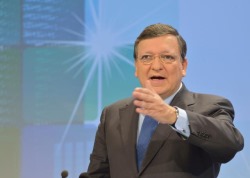The European Commission's policy framework for energy and climate in 2030 mandates a 40% reduction in emissions and grants member states significant freedom in achieving it in a more 'Europeanised' energy system.
 |
| José Manuel Barroso announces the framework |
The 2030 framework covers the decade after the current 2020 policy set, which stipulated a 20% reduction of emissions, 20% renewables in the energy mix and a 20% increase in energy efficiency by that date. All of these targets remain binding on all member states in what EC President José Manuel Barroso said had been a 'top-down' approach.
By contrast the framework announced today for the period from 2020 to 2030 takes a 'bottom-up' approach where each member state will construct a "holistic" plan for a "competitive, secure and sustainable energy" mix. Across the EU as a whole, these national plans must add up to show greenhouse gas emissions reaching 40% below 1990 levels, and a market share for renewables of at least 27% of energy.
Each country's contribution to the targets remains to be negotiated among the group of 28 states. National plans covering the details would then be developed in an 'iterative process' that the EC said would "ensure the national plans are sufficiently ambitious, as well as their consistency and compliance over time."
Senior EC officials said at a briefing today that emissions cuts pledged by each country would be enacted in legislation and would become binding. Although they were adamant that the renewables pledges in the plans "will add up to at least 27%", the officials could not confirm these too would become binding.
Barroso said the growth of renewables from 20% to 27% of energy by 2030 would be a function of the 40% emissions goal, and the EU's desire to achieve this would send the right signals to drive continued investment in that sector. It is anticipated that renewables will provide about 45% of electricity in 2030 including about 12% from hydro. Nuclear power is expected to stay at around 27%, leaving 26% for fossil fuels.
Jean-Pol Poncelet, director general of trade group Foratom, said it was "regrettable" that the reality of nuclear power's contribution was not emphasised in the European Commission's statements today.
Europeanisation
Barroso noted that widely varying state policies in the EU had "risked fragmentation of the internal market and had not been the most cost-effective way" to reach the 2020 goals. Accordingly, a key feature of the national plans will be compulsory collaboration and agreement with neighbouring countries. "What the European Commission is doing is Europeanising European energy," said an official.
This regional aspect to planning is intended to facilitate the most cost-effective placement of investment, and particularly of renewables. However, officials could not offer any details of how countries might fund joint investments.
Balancing the needs of 28 member states has been difficult, with a range of policies and desires represented in various countries for renewables, shale gas, nuclear power and coal. Three extreme cases have been Poland's desire to continue enjoying its supplies of cheap domestic coal; Germany's Energiewende push for renewables; and the UK's market reform and strong desire to maintain its nuclear sector. Connie Hedegaard, the commissioner for climate action said: "The art of politics is to propose something you can actually get through... If we did not do something this proposal would be dead here today."
The EC will soon give guidance to member states on developing their plans, giving them some six years to prepare. From today member states will consider their reactions to the 2020 framework for discussion at the European Council of heads of state in March. The negotiations on national goals should be complete in time for November, when new Commissioners are appointed.
Researched and written
by World Nuclear News






_15863.jpg)







